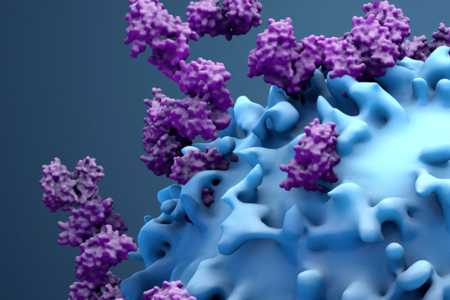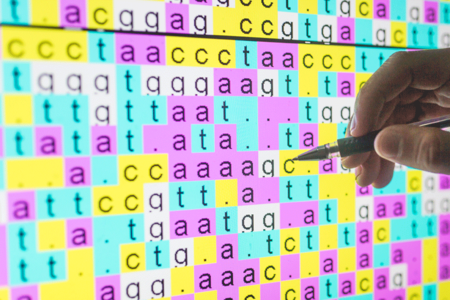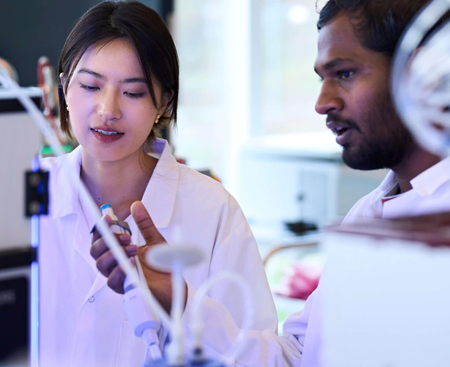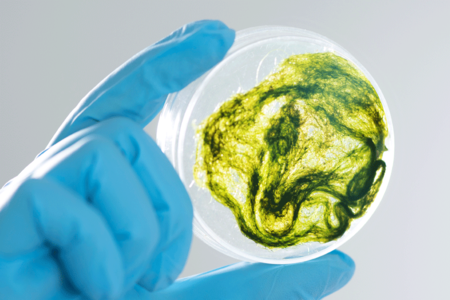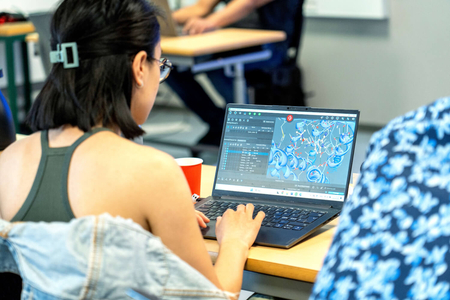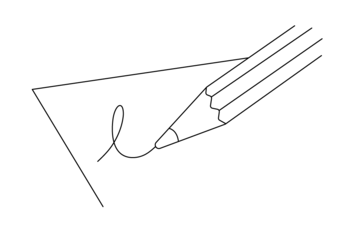Tine Hvarness works as a coordinator for the pharmaceutical company Xellia. “It’s research. It’s new knowledge. It’s exploring the unknown. I don’t regret having done the degree programme for a second,” says Tine.
Why did you choose to do Molecular Biomedicine?
I went to an 80th birthday and ended up sitting next to a distant relative who had just started studying molecular biomedicine. We talked about this all evening, and by the time I headed home, I just knew it was the programme I wanted to do.
When I later found out that the programme focuses on helping people with serious illnesses such as cancer and diabetes, the pieces just fell into place for me.
What does the programme involve?
Molecular Biomedicine revolves a lot around cells and their processes. The programme is essentially a fascinating mix of medicine, which focuses on treatment of the whole person, and biochemistry, which focuses on chemical processes and individual molecules.
You learn to think analytically – a skill I still use in my work today. You learn to understand all the sub-processes, and combine them to see the big picture. For example, working on a simple experiment in a laboratory, you still have to keep in mind where you would like to end up.
It’s research. It’s new knowledge. It’s exploring the unknown. It’s very specialised, and I don’t regret having done the programme for a second. It’s something very special.
Relatively few students are admitted each year, it’s intense, and you have to take responsibility for your studies. We were essentially like a small family.
What was your thesis about?
I did my master’s thesis at the Department of Growth and Reproduction at Rigshospitalet. It focused on young men with testicular cancer. In these patients, large numbers of immune cells have often been observed in the tissue. This is unusual because there are normally no immune cells present in the testicles, as they are separated from our normal immune system.
My job was to work out what kind of immune cells are present in these patients – and what their function might be. For example, might there be a correlation between the types of cells present and the type of cancer the patient has developed? It was really interesting and informative.
The overall goal of my thesis project was to look at whether – by characterising the immune cells present in the tissue – you could work out which of them would actually be able to kill the cancer cells.
In the long term, you might be able to design the immune cells and get them to kill the cancer. I know that a group at Herlev Hospital is already working with this type of immune cell therapy for skin cancer. The results are quite promising, as far as I’m aware.
Now you work for Xellia – what does the company do?
Xellia produces antibiotics and anti-fungal drugs, used by patients all over the world.
Our antibiotics and anti-fungal drugs help seriously ill patients. Not only patients who ‘just’ have pneumonia, but also patients with serious infections – for example, infections caused by multi-resistant bacteria such as MRSA. Globally, we have around 1,000 employees.
What does your job involve?
I’m in Sales and Marketing as a coordinator in the Global Technical Support section. It’s basically customer service at a scientific level. Global Technical Support helps Xellia’s customers with questions related to Good Manufacturing Practice (GMP).
We also support our customers in regulatory matters, such as obtaining relevant regulatory approvals. Finally, we respond to general and more technical enquiries related directly to the products. Examples could be: “We want to do this study, how can you help us with it?” Or: “Can we use your product in this way?”
Where does molecular biomedicine come into the picture?
My position does not have much to do with molecular biomedicine directly.
When I was working on my master’s thesis, we ordered antibodies from a company. One day they came to visit the department to present their latest best-selling product. That was when I realised. I wanted to do that kind of work – to help market products that can help others to advance their research and ensure the development of new medicines, or that can directly cure people.
My master’s thesis was a basic research project, so even though it entailed exciting possibilities, it will be a long time – several years – before it might be able to help patients suffering from real illnesses. So you could say that for me, basic research was moving too much in the slow lane. I would rather work in a field where I can help patients more directly – and that’s why I chose a career in the pharmaceutical industry.
I feel that my job is a wonderful mix of drawing on my knowledge of the natural sciences and being involved in the business side. I get the opportunity to work with many different aspects of the pharmaceutical industry, while staying within the realm of the natural sciences.
I use many of the skills and competences acquired at university on a daily basis. Perhaps it is more about thought processes and having a structured and analytical approach, rather than merely factual knowledge.
What are the job prospects like?
They’re quite good.
Most people from my year went on to do a PhD, but I have three university friends who are now working in different areas: One is a consultant for McKinsey, one works for the quality unit at Novo Nordisk, and one works with regulatory affairs – also for Novo Nordisk. I hope that the four of us can help show that there are alternative paths you can take, other than doing a PhD, if you want to.

